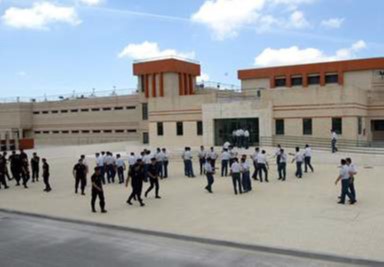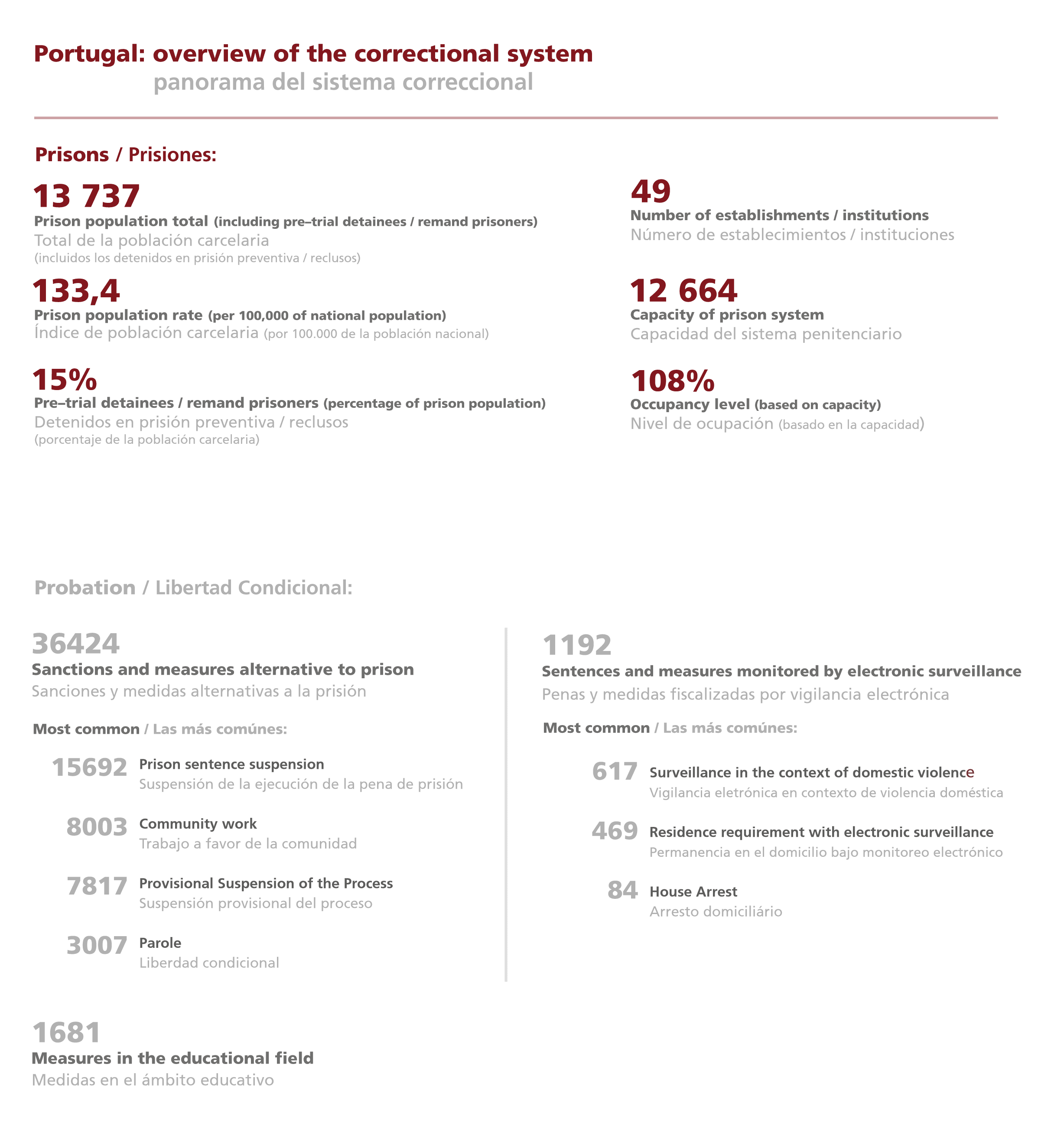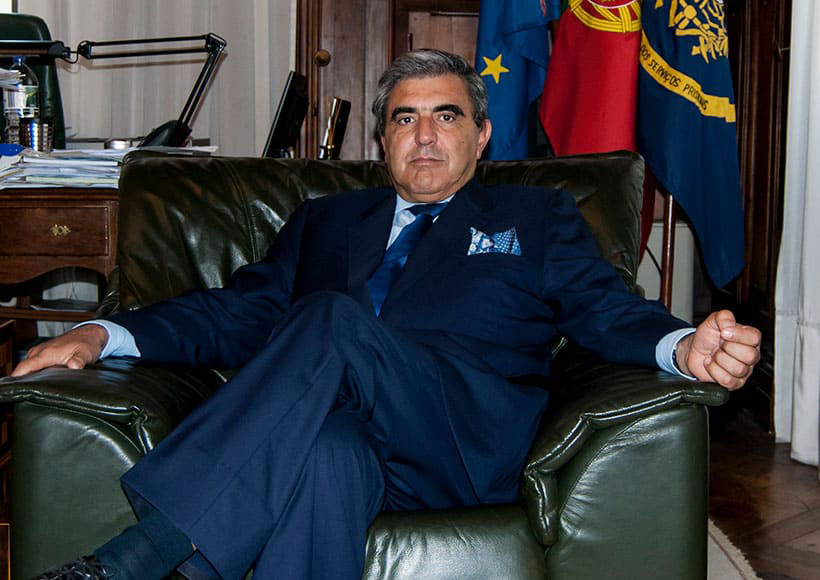// Interview: Celso Manata
Director of the General Directorate of Reintegration and Prison Services of Portugal
JT: You served as DG of the Penitentiary Services between 1994 and 2001.
What are the main differences between the Portuguese penitentiary system 20 years ago and the current one, and what is that represents greater evolution, both positive and negative?
CM: The last 20 years have been very striking: I notice differences “from day to night”, and most of them in the positive sense. When I arrived at the Service, in 1994, we had some facilities that were really medieval. Those circumstances have changed altogether since then. The penitentiary has evolved much, although it is also true that lately there have been some cuts in terms of investment.
We are immersed in a set of complicated situations which are difficult to solve, but in the last 20 years, there has been a great evolution, certainly positive, although in recent years, due to the crisis, we have had to face difficult situations. But, it is also important to note how the people working in the system relate to the inmates: there has been a radical change for the better.
Obviously we continue to have objectionable situations but these are exceptional; in other words, the idea that there was in the 90s about treatment has been surpassed. People already say that the prisoner is the subject of treatment. The way the inmate is seen and taken into account, obviously, is paramount.
On the other hand, we have also evolved in the characterisation of the prison population. Twenty years ago, more than 30% of the prisoners were in pre-trial detention, now we only have 15%.
This fact is a major leap because a system with a high percentage of pre-trial detainees has more difficulties. Prisoners serving sentences are more stable and with them, we can work more easily. Pre-trial detainees are a more complex population with a high turnover rate and we do not always understand the work that we can carry out with them.
Naturally, not everything is positive. Nowadays we have serious difficulties that we did not have in the past: budgetary difficulties that are really significant and tremendously conditioning, and I do not mean only the lack of money, but also everything that money can buy. Budget and material means are a main issue. In this matter, we present a very negative evolution. We cannot do more restraint in spending!

Also in terms of regimes, we have had major changes: the sentence enforcement code brought important news – we always had good laws and reforms for which we were internationally recognised, but they were very elastic laws, open for interpretation.
Today, we have a very tight regulation, a highly regulated sentence enforcement code and we have a general regulation that is very focused on the details, which is positive.
In this area, everything that is established in the code, in the law, in the regulation guarantees even more human rights, the rights of citizens, and allows a greater challenge in relation to the treatment of facts.
In this domain, there was a great deal of “ jurisdictionalisation” in the execution of the sentences – I would say that it was an unaccompanied evolution in terms of reinforcement of means at the level of the courts, which creates certain noise and distortion.
The open regime, for example, is an aspect in which we evolved negatively: the regulation led to the descent of the open external regime. At that time we had about 500 people in that situation and now we only have 60. With those 500 individuals, the number of failures we had was very similar to the one we have today.
The problem with the “ jurisdictionalisation” is that people who don’t work within the system (judges and magistrates of the Public Ministry) have a lower capacity to bear the risk. In fact – and this is something that the Council of Europe has repeatedly mentioned – the distribution of competences should not be done in a random way, but must be very well thought out according to the professional groups involved.
That is why many countries where it’s the judge who determines the regime and execution of the sentence are so criticised. It should be the penitentiary administration that decides which is the applicable regime because it is the administration that knows the prisoners and coexists with them daily.
Who is in the courts – I have the capacity to talk about this as I am a magistrate – will never have the possibility to really know the penitentiary reality. But, in addition to all that, their contact with prisons is not ideal either.
I recently met an old friend at a meeting in Paris – he used to be the director of the Luxembourg prison – who told me that the judges, in his country, spent a week taking contact with the prison situation and that for two days they even slept inside the prison.
In Portugal, judges, and prosecutors visit the penitentiary institutions only once, during an afternoon, and, therefore, this has consequences in the perception and understanding of what it is to serve a sentence.
In the last 20 years, I think the balance is positive. But are we at a point where we would want to be? We are not. We are very far from it. There are aspects that have worsened: some have to do with financial factors, others have to do with the circumstances of life, for example, the ageing of the population in prisons.
This is a reality throughout Europe which, obviously, has a big effect on our work. The issue of diseases, which in recent years has been substantially aggravated, above all, comorbidity, that also worsened, all this makes our job more difficult.
JT: What are the main challenges/problems facing the system and what measures are you implementing or will implement to solve them?
CM: One of the realities that deserves to be brought forward – because it is a problem itself that generates many other problems – is overcrowding. An over-crowded penitentiary can never function well! This problem can be solved in two ways: either by creating more prisons or by decreasing the number of prisoners.
It is known that, at the level of the UN or the Council of Europe, the solution to this issue is not to build more prisons, but to reduce the prison population. If this is true for a balanced system which has an occupancy rate in relation to its criminal reality, it’s even more significant in our case because we have a criminal reality that has nothing to do with our population of inmates.
Independent entities’ statistics show that violent or organised crime – two areas related to the number of prisoners – have been systematically declining. We have a very soft criminal reality that has nothing to do with other countries (such as France or Belgium, for example) with very serious problems in terms of insecurity and violent crime, and the truth is that these countries have around 100 prisoners per 100 000 inhabitants and we continue with 137.
The places that we have available at the moment are more than enough for the real prison population that we should have. We should have around 11 500, if we had that number we would be in a situation of underemployment!
The great investment to be made should be directed at the reduction of the population. That is what I have maintained and defended since the beginning.
JT: We know that you want to open a penitentiary center specifically aimed at older prisoners. What is this idea really about?
CM: In Portugal, as in Europe, we have seen a very significant growth in the number of elderly prisoners. On the other hand, we have also found that this population has very specific characteristics and needs. Of course, there are issues of illness, comorbidity, there are many needs that must be covered in other ways.
Faced with this reality, the way to approach them has to be different, because we are not talking about people who at 70 years will seek their first job. We cannot give them computer courses that they do not understand, or we cannot include them in a particular programme.
Something that especially strikes me is that these people are extremely fragile within the penitentiary universe; they are special people with special needs and they’re a growing group. It is important that we start thinking about creating a tailored response for this population.
That answer may have different formats, but I would like to first try it out as a first experience, that’s why we are searching for people who would be pleased to go through this experience. Then, depending on the results obtained, we will see which place a specific unit for this type of people would be created. This is a priority and shortly it’ll be decided.
We have seen a very significant growth in the number of elderly prisoners; they’re extremely fragile people within the penitentiary universe.
JT: You were a member of the European Committee for the Prevention of Torture. To what extent has this experience contributed to or influenced the way you work and see the system?
CM: Yes, for 10 years I had the pleasure of being a member of the CPT (European Committee for the Prevention of Torture and Inhuman or Degrading Treatment or Punishment).
It was a very enriching experience because I had the chance to make hundreds of visits to several European countries and see what the situation was like in each one and how they dealt with those situations.
It was also very interesting to be in Strasbourg with colleagues who had different points of view and sensitivities, to hear everything they had to share, with tolerance and receptivity, which allowed me, of course, to have a more open vision and also to have a greater capacity of analysis in relation to the challenges that we have in Portugal.
I have begun to appreciate some details regarding the need to create mechanisms meant to develop assertive and consistent attitudes towards the problem of ill-treatment and torture.
On the other hand, it also gave me some peace of mind as I realised that there are countries with few resources in which the challenges are solved in a satisfactory way as far as human rights are concerned, which means that money is not everything.
Treatment is something fundamental for any inmate and that does not depend exclusively on money; it has to do with the relationship that is created between the staff and the prisoners, and that relationship can be very professional and by the book, but later it lacks the affective component.
Some countries that may have a less scientific approach towards the treatment, have a more positive relationship in terms of the day-to-day relationship between the custodian, the technician or the director and the inmate, which ultimately brings a more positive result.
It is important to understand all this set of variables and it is necessary to put everything together and say that we want to improve our conditions, but we do not want to lose the relationship we have with people, because that, without a doubt, is a relationship that in most cases is very positive and very important for social reintegration.

We have a criminal reality that has nothing to do with our population of inmates: the places that we have are more than enough for the real prison population that we should have.
JT: What is the status quo of the country in terms of alternative measures to prison and how would you like the system to evolve in the short to medium term?
CM: Several things are missing. We could divide this conversation into three parts: the entries, the length of the sentence and releases. In the entries we have had a positive evolution: we lowered the number of pre-trial prisoners. Even so, we can go further.
The biggest problem is at the level of decisions and, in this matter, we have several issues: we have the issue that has to do with the half-detention basis (although this regime is not significant in terms of the number of cases).
At the moment, in Portugal, we have more than 500 individuals who are serving sentences on days off (only at weekends); this is a measure that has no effect in terms of penitentiary treatment, but which prevents us from having an important set of infrastructures available.
Then we have the problem of short sentences: we have many people who are in prison for not having paid fines, a situation that has to be solved. I am not saying that it is the fault of the judges, but I do consider that it must be solved.
Even in this segment, we have the problem of long sentences. If we look at Europe, we will very easily verify that there are several countries with life imprisonment where the average time served is much lower than ours: for example, in the Netherlands, the average penalty is of only 3 years whereas the average here is of 6-7 years.
What can you do here? One needs to have an attitude of clarifying the community because, logically, Justice is administered in the name of the people and, therefore, if the people feel that there is a need for this kind of reaction, the judge has to hear it. But this also has to do with us, that is, we must have a more proactive attitude to accompany the magistrates and propose other solutions.
Several experiences are underway and they are giving an excellent result: for example, we are assigning technicians of our Directorate next to the magistrates of the Public Ministry in the criminal courts of Lisbon, helping to unblock existing situations since 2012, which, at this moment, are already up to date.
We are applying more work for the community; In the cases of crimes associated with reckless or dangerous driving, we are trying to redirect towards programmes that have to do with road safety.
There is a lot of work that we have to do together with the Judiciary in terms of raising their awareness. Naturally, I think that the CEJ (Center for Judicial Studies) is also involved in this effort; we need that the judges and magistrates have the initial and permanent training to improve this activity, which, after all, has to do with what Europe says in relation to sentencing. It is something that already exists in other countries and we have to work on.
Then we have another part, the one regarding releases: here the situation is dramatic. Most of the inmates are released from prison at the end of their sentence. Here we have a much longer route to do because this is neither understandable nor justifiable.
Another important issue concerns the possibility provided by law that people, one year before parole, can come out of prison with an electronic bracelet. Despite this being provided for by law, nowadays if we had 15 or 16 people in this situation, this number would be very high. Obviously, this is regrettable!
Some of these problems are cultural and cannot be easily solved, but we cannot stand still waiting for a miracle. Therefore, the idea is to try to intervene at the legislative level – ending detention on days off and trying to increase the use of the electronic bracelet. We do not yet know what impact it will have, but I am confident and expectant that it will be a decisive step in a positive direction.
JT: How do you see the future of the correctional services sector in Portugal?
CM: We have problems that constrain us a lot, mainly the lack of personnel – something that has been reported in the press and is not a lie. There is a lack of prison officers (guards), but there is also a shortage of technicians, whose numbers have been greatly reduced: in 1999 we had 5,348 officials of which 3,864 were guards, that is, 62%.
In 2016, after the merger between the penitentiary and the social reintegration services, we have 6,299 officials – a thousand more staff members – and the number of guards passed to 4,544, so there is a significant decrease of technical professionals.
Although guards are important, the truth is that security is not our core business, ours is social reintegration and the end of sentences. Safety is a requirement that we have to ensure in order to do our job.
Therefore, we have a significant lack of prison guards, we are working on that – now we are going to hire 420 – but more complicated than that is the lack of technicians, which complicates our activity in the area of reinsertion.
We have worked in a generally positive way in the conception of the programmes: we already have 14 programmes outlined; I am referring to a set of approaches, manuals, guidelines and directions for prison institutions to treat a group of prisoners in a particular way. Those programmes are not being put into practice in all the institutions because there are no technicians for their application.
The emotional stabilisation programme, for instance, should be applied to everyone, but the programmes and actions can only be carried out if we have a sufficient and capable technical team. We are at a point where we have the technicians doing bureaucratic work and not talking to the inmates. I think it is fundamental to work on these types of programmes in order to move towards effective reintegration.
In the same way, it is essential to continue also with the activity of articulation with the community: it is necessary to conclude agreements and protocols with a group of public and private entities aiming at creating more and more systematic connections, that is, to engage sustainable and strong collaborators that would manage to carry out the activities in a group prisons.
The articulation with the community is important because we must have a phase in which the inmates work outside – the open regime is a very interesting instrument to produce a greater and more sustainable and solid relationship with the community – and for that, we must gather some help. Here I emphasize the role of the town halls.
These articulations not only help the social reintegration but also allow to convey an image of the inmates different from the one that people have and that can and also should be changed through positive examples.
If the community had a different vision, it would probably be more sympathetic towards the legislative changes we’d like to make.
The cohabiting of prisoners and the community is an investment and a factor of stabilisation because we have inmates who aspire to be in an open regime.
Social reintegration involves trying to have more programmes and activities in a structured and useful way; it involves an articulation with the business network, with other community bodies – especially with town halls – and with private social solidarity institutions, who are indispensable collaborators.
//
In 2016, Celso Manata was appointed Director General of Reintegration and Prison Services, a position that was already known to him since he had been Director of the Prison Services between 1994 and 2001. At the time of this appointment, the magistrate held the position of Deputy Attorney General,
being a specialist in the area of family and minors. Celso Manata was also a member of the European Committee for the Prevention of Torture of the Council of Europe.


